Theo Final Exam Review PDF

| Title | Theo Final Exam Review |
|---|---|
| Author | Kyle Vick |
| Course | Introduction to Christian Ethics |
| Institution | Concordia University |
| Pages | 16 |
| File Size | 343.3 KB |
| File Type | |
| Total Downloads | 79 |
| Total Views | 133 |
Summary
Download Theo Final Exam Review PDF
Description
THEO 204 – Final Exam Review Session Winter 2019 Summary
Part 1: Multiple choice questions (worth 20%) Answer all 20 questions, must be answered on an answer book not on the exam sheet. Here’s an example of a multiple choice question THAT WILL BE IN THE EXAM:
Divine command ethics means: A) An act is right because God commanded it B) God commands an act because it is right C) One can never know whether an act is right or wrong D) None of the above The answer to this questions can be found in the notes under Divine Commands Ethics.
Part 2: Short answer questions (worth’s 20%) Answer only 10 of the 20 questions (each question is worth 2%) she recommends reading all the questions to then select the 10 you’ll be responding. Each answer must be around 2 to 4 sentences, (4-6 lines) double spaced. ***Writing must be clear so it is required to use double space.*** Here’s an example of a multiple choice question that WILL BE IN THE EXAM: What is the difference between moral evil and pre moral evil: Moral evil refers to intentionally doing something wrong, pre moral evil is related to accidents that hurts someone else like floods and tsunamis. So, the difference between these 2 is one is intentional (moral evil) and the other is unintentional (pre moral evil). ***********************************************************************************
Re Review view Guide ffor or Final Exam (No need to study or revi review ew anything else besid besides es these sections given on whic which h the exam will be based on)
Lesson T Two: wo: Faith and Reason
New Testament Ethics
Faith Vs. Reason • Reason: Our capacity for rational thought. God is not necessary for morality- no need for revelation from God • Faith: Faith is to trust in God. Morality is only possible because God revealed it to us. God’s grace leads to a good life New Testament Ethics • Bible does not have a single ethical perspective • Morality is contextual- no universal rules • “Kingdom of God is at hand”= heuristic for Jesus- uses this to teach people what it is to live a good life (central theme- the kingdom is present and with his own person) Features about the approach of the people of the Bible: • Behaviour is a response of God’s will • God is revealed through Christ • Unity between the Hebrew Scriptures and the New Testament There is no fully worked out moral system in the New Testament Characteristics of the New Testament 1. Priority of love over other virtues 2. Morality is not prescribed in a rigid manner Early Christian Communities • Must discover moral response in face of specific moral problems • Jesus’ sayings could be applied to new communities • Cultural diversity among believers • Paul’s teachings were always contextual
Lesson Three: Natural Law (not the section on Bonaventure) (You need to pay attention to who is Thomas Aquinas, Aristotle influence on Aquinas, Theological and deontological etc.) Natural law • Moral duties can be ascertained by reflection on human nature • God’s plan for us is built into nature by God’s creation of us • Based on Romans 2:14-16 a law written in our hearts • Using our reason to reflect on our human nature, we can discover both: 1. the specific ends toward which we tend the general rule for which God created us • Revelation is not necessary for moral knowledge • When we have discovered these ends, it is then possible to determine the means required to achieve them. For Acquinas, - this understanding of God’s plan for us - built into our nature by God’s act of creation - is natural law The basic principle of natural aw- good should be sought after, evil should be avoided
• Aristotle: human nature is rational + morally good actions are those that are directed (through reason) toward the full actualization of human potential Thomas Aquinas • Drew on Aristotle for his articulation of Christian theology • Humans are intellectual beings Key points 3. Human agent is responsible for his actions 4. God had given beings the capacity to be responsible Aquinas accepted both “order of nature” and “order of reason” Aquinas links natural law with: • Practical reason (for which humans are capable) • Eternal law (God is the source of moral value) For Aquinas, even though the immediate source of moral knowing is human reason, God’s eternal law is the underlying source We can discover both specific ends (what we control) and general ends (waht God wants) In summary for Aquinas: • This understanding of God’s plan for us, built into our nature by God’s act of creation is natural law • Special revelation is not necessary for moral knowledge Teleogical: Constructing something with an end in view. Primary concern is determining which action will bring about the goal being sought. Therefore, approach the question, “what ought I to do” by fist asking “what is my goal?” • Focus is on the end/consequences of an act • Utilitarianism • Takes into consideration the context Deontological: Seeks to establish the law, duty, right, or obligation in question on the basis of the intrinsic aspects of an act rather than on its consequences. Approaches the question, “what ought I to do” by first asking “what is the law” or “waht is my duty” 5. Focus is the law, the rules, the duty, which take priority over results of an action
Reformation (no questions on nominalism) Luther= The originator of the reformation in Europe Reformation: The 16th century movement for reform of the doctrines and practices of the Roman Catholic Church which ended in the establishment of Protestant churches
His criticism of the Catholic Church centred around indulgences: Refers to the lessening of a punishment for a sin committed. In Medieval times, Christians contributed money to the Church to lessen their penance for sins committed • Indulgences were sold to rebuilt St. Peter’s Basilica in Rome In response, he emphasized that faith alone could save a human being; we are in need of Christ’s relation if humans are to know what is good In summary, Luther; 6. Rejected Acquinas’ tradition 7. Re-appropriated that biblical tradition with his emphasis on surrender to God 8. Insists that faith alone saves a human being, not good works John Calvin and Predestination • Accepted Luther’s criticism of the Roman Catholic Church • If everything was God’s work, then an absolute and formal pre-destination was a clear fact Human free will played no role in one being saved
Free will and determinism
Believers in free will • At least some human actions are the result of the free rational choice of humans Supporters of Determinism 9. All human behaviour is due to the operation of causes similar to those which determine the course of events in the natural world Various Forms of Determinism Physical and chemical= genes determine aspects of personality Sociological= behaviour is determined by society we live in Economic= human behaviour is shaped by economic factors Theological= Calvin’s emphasis on divine providence and predestination • The human will is so disabled by sin that it cannot choose good through the supervention of grace (determinism) • The human person has the capacity to develop and grow, and so has the capacity to choose good over evil (freedom)
Counter R Reformation eformation – particularly the Council of T Trent rent Counter Reformation • The revival of the Roman Catholic Church (Mid 16th and 17th centuries) • Efforts to counter what Luther was saying about faith alone will save you • Effort to revitalize ancient practices • New orders and reforms • Increasing the number of clergy Council of Trent
10. Meeting of bishops of the whole Church to discuss/settle matters of Church doctrines and practices 11. Council was Church’s formal response to the challenges of the Reformation It emphasized • Faith alone was not sufficient for justification, it must be accomplished by love and hope (charity) • Unwritten traditions and scriptures were to be received equally • Seven sacraments Trent emphasized free will and good works instead of on the importance of knowing proper and moral action Trent stressed the importance of the sacrement of penance All catholics were obligated to confess once a year Manuals of moral theology were emerged to help priests in their role as confessors
Also, pay at attention tention to the scripture/tr scripture/tradition adition debate between Protestants and R Ro oman Cath Catholics olics (Slide 16 and 23)
Lesson F Four: our: Enlightenment – influence on ethics (Only the section: the influence on ethics, also focus on definition between ethical absolutes and relativism in ethics this is under the section catholic concerns) (Pay attention to the definitions in lessons 2-3-4 which were the base of the mid term exam some will come back in the exam) The enlightened thinkers grammatically influenced ethics by • Presenting a materialist view of the human being • Explaining everything that happens in the world in terms of laws and nature • Grace has no place in the world of the Enlightened • Reason and individualism were emphasized • No need for revelation; human reason to find truths • Emphasis on individual conscience • Each person has capacity to discern good and evil • Role of tradition and authority in guiding moral living was downplayed Ethical Absolutes and Relativism in Ethics Ethical Absolutes: An absolute value or good is one that maintains its validity under any and every circumstance Three arguments against: • There is no objectivity or universality to moral judgements, nor any unified human nature • Rules are relative to a geographical time and place • The problems of legalism and moralism
Relativism in Ethics 12. What is right or wrong for a person varies in relation to their culture 13. There is no standard or objective morality 14. What is right differs by context
Lesson Fiv Five: e: Foundation of ethics
Two types of moral questions • Knowing the good; “what is the good” • Doing the good; “shall I choose to do the good” How we deliberate on what we should do do • We must first consider the notion of responsibility; humans respond to the world. To be human is to respond • When asking the question, “what should I do”, this responds to a particular situation that demands some decision Ethics is concerned with knowing and doing; if an issue involves action, it is an ethical issue No act is neutral The meaning and foundations of ethics is related to ourselves in the process of ethical deliberation The foundation of ethics is the basic experience of responsibility that all human beings experience
Moral process
The Moral Process • How we interpret a situation and how we decide to act on it There are four distinct and reoccurring operations that we all do when we respond to our world 15.Experiencing involves our attientivnes; desirePatterns to our noticing; our experience is selective (biological, practical, dramatic, artistic, intellect)What is it? 16.UnderstandingInvolves our intelligence Curiosity leads to insight; we want to understand the things we noticeIs it so?Fact questions 17.JudgingInvolves our reasonWhat am I going to do? 18.DecidingInvolves our capacity to respondWhat should you do?- entering the explicitly moral realmIs this the right thing to do= ask questions
Moral deliberation – moral horizons and conversion (No questions on ethical theories)
Moral Deliberation Moral Horizon: We are limited in our ability to know what is true and good • We don’t know everything • We may have unexamined biases • We may be working with lack of knowledge • Moral or psychological unfreedom • Stunted spiritual development
Conversion: The process by which a human being moves beyond his or her moral horizon Conversions are what expand our moral horizon 19. Conversions are what expand our moral vision 20. Liberating experience, but can include leaving something behind as we reach for something new 21. Reorients our moral landscape
Lesson Six: Social Structures – definit definition ion
Moral knowing
Moral Knowing Moral knowledge • All human actions initiate a direction of change 22. Moral knowledge is grasping what the direction of change is. To know something is wrong is to understand how it gets in the way of human progress 2. Every situation in our lives involves “relations among events” • Context, intentions of those invovled, consequences of actions, goals of the social structures. Moral knowledge grasps how all of these interrelated 3. Moral knowledge always aims at understanding what enriches our lives together and what destroys it
Levels of the good
Three meanings of the word “good” • •
Good is as satisfying a personal desire/interest The good as accountability to a wider social order that transcends personal desires. The need for a higher frame of reference to make judgements of value (when personal desires conflict) • Critique of the good of a social structure. Seeing the dark side of social structures and evaluate them against wider standards The levels of good…
Meaning of Good
Level or Horizon
Attitude towards social structures
Good=satisfaction
Personal interest
Social structures as means to personal fulfilment. They become fragile when governed at this level
Good=Harmony
Interpersonal order or social structure
Commitment to social order. Social structures are stable. Concern for social order over individual benefit
Good=value
The longer dynamics of progress and decline
Commitment to historical progress. Social structures
have become explosive and destructive; therefore they require social critique with the goal of social renewal
Levels of good are hierearical; advancement in our capacity to evaluate morally or ethically because higher levels are more comprehensive than the lower
Aspects of moral foundations
Aspects of Moral Foundations Five steps in exploring aspects of moral foundations •
The foundation of moral knowledge is the people performing the operations of insight, judgement, and decision23. Moral knowledge is only moral when it is linked to a person, prior to that, it is random data 2. The two-fold thirst of moral action Moral action also has a double thrust; first, it concerns the concrete issue we are dealing with here and now. Second it concerns the shaping of our moral character 3. There is a link between the individual and the social in relation to morality • Society impacts our actions, and our actions impact society 4. Freedom • Positive and negative ways of thinking about freedom. Our freedom grows as our capacity to understand, judge, and decide what the right thing to do grows.
5. Our Moral Obligations • We are obligated to take a moral responsibility for developing ourselves as moral persons • We are obligated to participate in reinforcing and developing virtuations patterns of social identity • We are obligated to remove obstacles that block development
“Freedom is . . . “ - types of freedom
• FREEDOM FROM DOMINATION Negative way of viewing freedom 2. Freedom as a Self Determination (Postiitve ) Link between freedom and our capacity to perform acts of moral meaning 3. Essential Freedom Capacity to exercise a determinate control over our actions through the operations of moral meaning 4. Effective Freedom Limits of this capacity
Lesson Seven: The nature of evil
The Nature of Evil According to Aquinas • Evil is the privation of good
• Exil exists as a negative • The absence of a good that should exist The Good= the human flourishing that comes about through fidelity to truth The Risk of Evil= the privation and the pervasion of the Good The forms of evil 24. Betrayal 25.Delusion (decisions made on the basis of flawed jdugements, which can cause immense damage) 26.Terror (use of intimidation)
The problem of evil (what is evil)
What is Evil • Morally bad, unacceptable, sinful, corrupt • Impedes the achievement of goals, ideals, happiness, or general well-being (Oxford English Dictionary) The Problem of Evil We need to consider evil as emerging in both intentional and unintentional acts Moral Evil: The transgression of the moral law, the intentional breaking of a law. In terms of Christian faith, moral evil would be considered disobedience to the will of God. For example, murder Premolar Evil: The ills that do not proceed directly from human sin or human intention. For example, natural disorders
The surplus of evil and the religious realm (this is very important, this was in the 4th question of the study guide) We are limited by our moral horizons. This limitation stems from our developmental nature. Despite our efforts to become aware of our biases/blocks, we will always be limited in our moral knowledge Different types of development Biological: We are bron, we grow and develop. There are limits- our development reaches ts apex at a certain age and then declines Sensitive: We are aware o ourselves in a particular space, we have recognition and memroy. tHis is also a natural form of development Intellectual: Unique to humans. It is a process that can be honed, improved, and developed intentionally. The essential root to human freedom. Our human development confronts us with two fundamental tensions • •
Moving from the familiar to unfamiliar. Part of us wants to harmonize an the other part wants us to move on, change, grow, and develop Human development is from what one is now toward becoming a fuller, more developed being. Our reaching to being good makes us aware of our
limitation. The tension here exists between limitation and transcendence. Our seeking and questioning are infinite but our capacity to answer these questions are limited. These tensions are the reason we participate in corrupt social structures without explicit awareness. Evil can expand in directions completely removed from our conscious intention. The Surplus of Evil and the Religious Realm Religious realm: The realm of human existence that concerns ultimate value and meaning The surplus of evil pushes us into the religious realm because: • the effects of eval can reach far beyond our explicit intentions • It is difficult to understand evil • Evil appears to be structural more than the individual
Challenging evil (progress ad decline)
Progress: Advancement without limitations Decline: A downfall in progress, a limitation that forces an idnivudal from progressing. Development is blocked, our biases block our growth, we experience inauthenticity, we run up against tragedy, sorrow, discouragement. Redemption: Recovering from decline growth, and development can and do happen. We experience being freed from some imprisonment. We cannot reverse decline from within the resources of decline itself. Christian faith as a response to the challenge of evil • Decline leads us to question God. The experience of evil can bring hopelessness and a sense of meaningless. For Christians, faith in Christ restores one’s commitment because Christ reveals to us that God is at work in history.
Lesson Eight: Followers of Christ – progress, decline and redemption (there will be questions on this part) Followers of Christ Christian faith is a personal encounter with the power of grace that restores a person as a responsible agent of the good. THis power is a mystery and a gift. It is revealed most fully in the death and resurrection of Christ. The faith perspective provides three analytic tools for understanding human affairs. Progressive: What it means to be human • Results from natural development of human intelligence. This directs our lives towards authenticity. • Questioning directs us toward what is true.
Similar Free PDFs

Theo Final Exam Review
- 16 Pages

Chem Final Exam Review
- 12 Pages

Final Exam - Review notes
- 92 Pages

Bio Final Exam Review
- 2 Pages
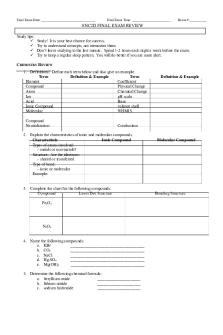
Final EXAM Review booklet
- 5 Pages
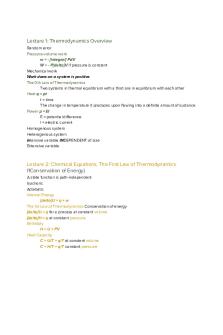
CHEM303 final exam review
- 4 Pages
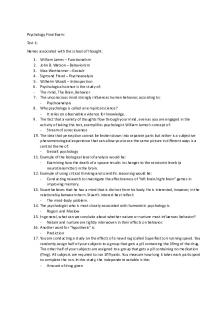
Psychology Final Exam - Review
- 13 Pages
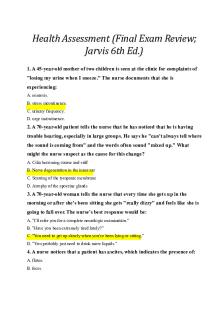
Jarvis Final Exam Review
- 12 Pages
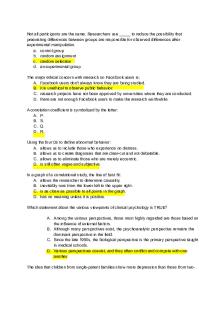
Final exam review
- 96 Pages
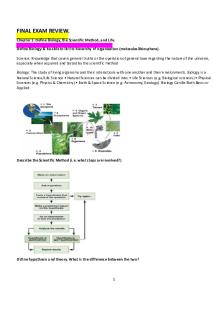
Final Exam Review
- 48 Pages
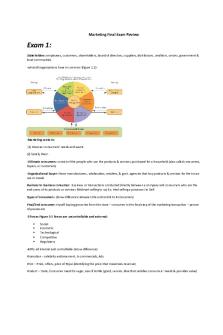
Marketing Final Exam Review
- 15 Pages
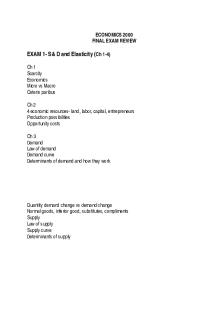
Final exam review
- 8 Pages
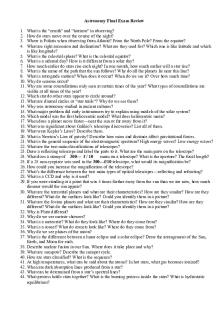
Astronomy Final Exam Review
- 2 Pages
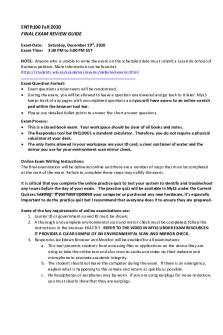
Final Exam Review Guide
- 4 Pages

Final exam review flsp4420
- 5 Pages

Entrepreneurship final exam review
- 33 Pages
Popular Institutions
- Tinajero National High School - Annex
- Politeknik Caltex Riau
- Yokohama City University
- SGT University
- University of Al-Qadisiyah
- Divine Word College of Vigan
- Techniek College Rotterdam
- Universidade de Santiago
- Universiti Teknologi MARA Cawangan Johor Kampus Pasir Gudang
- Poltekkes Kemenkes Yogyakarta
- Baguio City National High School
- Colegio san marcos
- preparatoria uno
- Centro de Bachillerato Tecnológico Industrial y de Servicios No. 107
- Dalian Maritime University
- Quang Trung Secondary School
- Colegio Tecnológico en Informática
- Corporación Regional de Educación Superior
- Grupo CEDVA
- Dar Al Uloom University
- Centro de Estudios Preuniversitarios de la Universidad Nacional de Ingeniería
- 上智大学
- Aakash International School, Nuna Majara
- San Felipe Neri Catholic School
- Kang Chiao International School - New Taipei City
- Misamis Occidental National High School
- Institución Educativa Escuela Normal Juan Ladrilleros
- Kolehiyo ng Pantukan
- Batanes State College
- Instituto Continental
- Sekolah Menengah Kejuruan Kesehatan Kaltara (Tarakan)
- Colegio de La Inmaculada Concepcion - Cebu